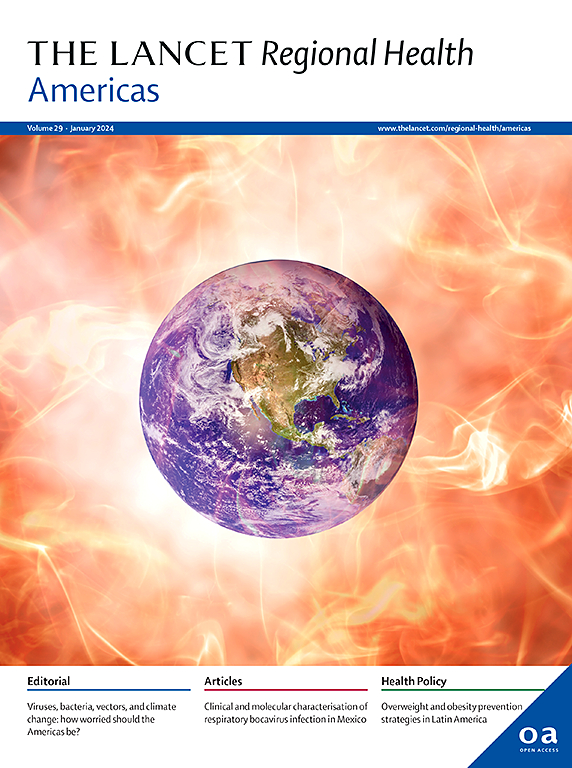与土著、西班牙裔、黑人和白人老年人认知健康轨迹相关的可改变因素:以土著为重点的健康和退休研究的探索性纵向面板分析
IF 7
Q1 HEALTH CARE SCIENCES & SERVICES
引用次数: 0
摘要
背景:尽管老年痴呆症风险升高,土著老年人的认知健康仍未得到充分研究。本研究探讨了土著、黑人、西班牙裔和白人老年人中可改变因素与认知健康的关系。方法使用来自健康与退休研究(2006-2020,N = 27,327)的纵向面板数据,我们估计混合效应增长曲线模型,以检查可改变因素与总认知功能之间的关系。研究结果:这一多样化的样本包括土著人(1.65%)、黑人(11.43%)、西班牙裔(9.85%)和白人(77.07%)老年人,平均年龄为61岁(SD = 9.66),其中52%为女性。尽管平均年龄更年轻(M = 59), 3%的土著受访者报告了与记忆相关的诊断,是总体样本率的三倍。线性混合效应生长曲线分析显示,土著和黑人老年人具有相似的认知轨迹。大学教育是种族间初始认知功能的保护因素(b0 = 3.09, 95% CI: 2.91, 3.27),随着时间的推移(b = 0.24, 95% CI: 0.15, 0.33)。与非志愿者相比,正式志愿者(b = 0.21, 95% CI: 0.15, 0.27)和非正式志愿者(b = 0.26, 95% CI: 0.20, 0.32)的认知能力下降速度较慢,尽管这些影响可能部分反映了社会经济地位。在土著老年人中,高等教育、志愿服务和较少的抑郁症状与更好的认知结果有关。尽管资源被严重剥夺,土著老年人表现出支持认知健康的适应力。通过有针对性的社会政策扩大受教育和晚年志愿服务的机会,可能会提高土著社区几代人的认知成果。本研究由美国国家老龄研究所(R36AG078781)资助。本文章由计算机程序翻译,如有差异,请以英文原文为准。
Modifiable factors associated with cognitive health trajectories among Indigenous, Hispanic, Black, and White older adults: an exploratory longitudinal panel analysis of the health and retirement study with a focus on Indigenous peoples
Background
Despite elevated dementia risk, cognitive health among Indigenous older adults remains understudied. This study explored how modifiable factors were associated with cognitive health among Indigenous, Black, Hispanic, and White older adults.
Methods
Using longitudinal panel data from the Health and Retirement Study (2006–2020, N = 27,327), we estimated mixed effect growth curve models to examine associations between modifiable factors and total cognitive function.
Findings
This diverse sample of Indigenous (1.65%), Black (11.43%), Hispanic (9.85%), and White (77.07%) older adults had a mean age of 61 (SD = 9.66) and was 52% female. Despite being younger on average (M = 59), 3% of Indigenous respondents reported memory-related diagnoses three times the overall sample rate. Linear mixed-effect growth curve analysis revealed that Indigenous and Black older adults had similar cognitive trajectories. A college education was a protective factor for initial cognitive function (b0 = 3.09, 95% CI: 2.91, 3.27) and over time (b = 0.24, 95% CI: 0.15, 0.33) across ethnicity. Formal (b = 0.21, 95% CI: 0.15, 0.27) and informal (b = 0.26, 95% CI: 0.20, 0.32) volunteering were associated with slower rates of cognitive decline relative to non-volunteers, though these effects may partly reflect socioeconomic status. Among Indigenous older adults, higher education, volunteering, and fewer depressive symptoms were linked to better cognitive outcomes.
Interpretation
Despite high levels of resource deprivation, Indigenous older adults demonstrate resilience that supports cognitive health. Expanding access to education and volunteering in later life through targeted social policy may enhance cognitive outcomes in Indigenous communities for generations.
Funding
This research was supported by the National Institute on Aging (R36AG078781).
求助全文
通过发布文献求助,成功后即可免费获取论文全文。
去求助
来源期刊

Lancet Regional Health-Americas
Multiple-
CiteScore
8.00
自引率
0.00%
发文量
0
期刊介绍:
The Lancet Regional Health – Americas, an open-access journal, contributes to The Lancet's global initiative by focusing on health-care quality and access in the Americas. It aims to advance clinical practice and health policy in the region, promoting better health outcomes. The journal publishes high-quality original research advocating change or shedding light on clinical practice and health policy. It welcomes submissions on various regional health topics, including infectious diseases, non-communicable diseases, child and adolescent health, maternal and reproductive health, emergency care, health policy, and health equity.
 求助内容:
求助内容: 应助结果提醒方式:
应助结果提醒方式:


